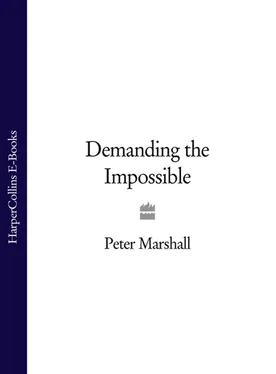It has been argued that anarchism does not preclude the legitimacy of every type of authority and that anarchists are really opposed only to ‘imposed authority, or authoritarianism’. 42 Again, it has been asserted that libertarians reject ‘command-authority’ in coercive institutions, but are willing to accept ‘belief-authority’ in which a person voluntarily legitimizes the influence any other person may have upon them. 43
There is some evidence to support this view. Some anarchists have accepted certain attenuated forms of authority. Bakunin, while rejecting the government of science, accepts the authority of superior or technical knowledge. However, while recognizing the authority of technical competence, he insists that the advice of an expert should only be accepted on the basis of voluntary consent: if I am to accept the authority of the cobbler in the matter of shoes, my decision to act on his advice is mine and not his. Malatesta also believes that it is inevitable that a person who has greater understanding and ability to carry out a given task will succeed more easily in having his opinion accepted, and that it is all right for him to act as guide in his area of competence for those less able than himself.
It is also the case that many anarchists look to some kind of censure in the shape of public opinion or social pressure as a means of influencing the behaviour of others in the absence of positive laws. Such censure can be extremely authoritarian by making people comply with threats. Indeed, in a society without public authority, Godwin wrote that ‘general inspection’ could provide a force ‘not less irresistible than whips and chains’ to reform conduct. 44 Bakunin also argued that the ‘only great and all powerful authority … we can respect is the collective and public spirit’. 45
More recently, Giovanni Baldelli has followed Bakunin in arguing that the ‘rule of authority’ is acceptable if it is based on competence as well as consent. 46 David Wieck has gone even further to defend delegated authority if it does not entail power over persons. 47 Alan Ritter has also tried to elaborate an anarchist justification of authority by claiming that it is legitimate if it is shared by all and if it is ‘intimate, particular and internal and cannot issue directives of a legal sort’. 48 And Miller argues that anarcho-communists accept a form of authority, although it is ‘non-compulsory, non-coercive, functionally specific, and exercised collectively in a particular locality or shares a particular interest’. 49
But it would be wrong to infer from this that despite their alleged claims to the contrary, anarchists in fact all accept some form of authority. Bakunin’s defence of the authority of superior knowledge, for instance, would be anathema to Godwin as an infringement of the right of private judgement. Any reliance on someone with superior knowledge is for him the most pernicious form of authority since it prevents independent thought and encourages a spirit of dependence. Again, while accepting that the influence of public opinion is preferable to the tyranny of the law, Godwin rightly insists that ‘coercion cannot convince, cannot conciliate, but on the contrary alienates the mind of him against whom it is employed’. 50 People may advise and admonish an individual, but he should act by his own deliberation and not theirs.
In general, anarchists reject the use of physical force or even manipulation by unconsciously changing beliefs and actions. They deny anyone the right to issue orders and have them obeyed. They are highly critical of political and bureaucratic authority and do not wish to become dominating leaders, even within small, informal groups. Instead, they prefer to influence others through persuasion, offering rational arguments for their anarchist beliefs and practices. Some may accept a temporary form of leadership based on competence, but most believe in leaderless groups and have no time for bosses or masters. Even if in practice anarchists have voluntarily followed charismatic leaders, they are aware of the dangers of such a form of leadership.
Michael Taylor argues that if we get a person to do something he would not otherwise have done by using convincing reasons, we are still exercising authority. 51 But this would seem to confuse persuasion with authority. What distinguishes authority from persuasion and influence is its claim to legitimacy, a claim which all anarchists deny. Authority is also invariably exercised in a clearly defined hierarchy in which superiors assert the right to issue commands and subordinates are obliged to obey. Of the classic anarchist thinkers, only Bakunin was ready to resort to manipulation through his ‘invisible dictatorship’ and his secret societies.
If they do not reject all forms of authority outright, all anarchists are suspicious of authority, especially that imposed from above, and seek to minimize its influence in society. They certainly do not want to erect an ‘anarchist authority’, even if all participate in it. 52 What distinguishes anarchists from other socialists is the precise fact that they are ‘anti-authoritarian’. Unlike Engels, they believe it is quite possible to organize production and distribution without authority. For anarchists, organization without compulsion, based on free agreement and voluntary co-operation, is the only cure for authority. To this end, anarchists call for the decentralization of authority and finally for its maximum dissolution.
Authority is clearly a manifestation of power, but they are not identical. Power may best be defined as the ability to impose one’s will. Power is different from authority for where the latter asserts the right to command and the right to be obeyed, the former is the ability to compel compliance, either through the use or threat of force. A society without political authority can still have coercive power relationships.
In general, anarchists believe not only that power corrupts, and absolute power corrupts absolutely, but that power destroys both the executioner and victim of power. Their awareness of the corrupting nature of power is the basis of their criticism of concentrated power and their reluctance to relinquish any power to leaders and rulers. The State consists of nothing more than a small elite who have more power than the rest of society. Anarchists therefore call for the decentralization of political power in the short term and would like to see it dissolved as much as possible in the long term.
But power is not only political. Bertrand Russell defines power as ‘the production of intended effects’. 53 Power in this sense in existing society is ubiquitous, diffuse and often concealed. Power over human beings may usefully be classified by the manner of influencing individuals or by the type of organization involved. An individual may be influenced by direct physical power over his body, (army and police); by rewards and punishments which act as inducements (economic organizations); by the sway of opinion or propaganda (schools, churches, political parties). Indeed, the distinctions between the organizations are not always so clear cut as they often use different forms of power at the same time.
Within society, there is also traditional power (an ancient form based on custom); newly acquired power (such as law based on coercive power of the State or ‘naked’ military power); and revolutionary power (of party or group). Anarchists would condemn all three, though some like Kropotkin would accept the first as the least pernicious, and others like Bakunin would accept the last in the form of a mass uprising. All however would oppose any centralization of power, which, as Alex Comfort has argued, leads to psychopathic leadership: ‘The greater the degree of power, and the wider the gap between governors and the governed, the stronger the appeal of office to those who are likely to abuse it, and the less the response which can be expected from the individual’. 54 Even ‘anarcho-capitalists’ like Murray Rothbard assume individuals would have equal bargaining power in a market-based society.
Читать дальше












